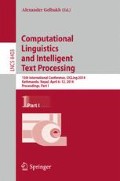Abstract
LDA considers a surface word to be identical across all documents and measures the contribution of a surface word to each topic. However, a surface word may present different signatures in different contexts, i.e. polysemous words can be used with different senses in different contexts. Intuitively, disambiguating word senses for topic models can enhance their discriminative capabilities. In this work, we propose a joint model to automatically induce document topics and word senses simultaneously. Instead of using some pre-defined word sense resources, we capture the word sense information via a latent variable and directly induce them in a fully unsupervised manner from the corpora. Experimental results show that the proposed joint model outperforms the classic LDA and a standalone sense-based LDA model significantly in document clustering.
Access this chapter
Tax calculation will be finalised at checkout
Purchases are for personal use only
Preview
Unable to display preview. Download preview PDF.
References
Blei, D.M., Ng, A.Y., Jordan, M.I.: Latent dirichlet allocation. J. Mach. Learn. Res. 3, 993–1022 (2003)
Navigli, R., Crisafulli, G.: Inducing word senses to improve web search result clustering. In: Proceedings of the 2010 Conference on Empirical Methods in Natural Language Processing, EMNLP 2010, Stroudsburg, PA, USA, pp. 116–126. Association for Computational Linguistics (2010)
Boyd-Graber, J.L., Blei, D.M., Zhu, X.: A topic model for word sense disambiguation. In: EMNLP-CoNLL, pp. 1024–1033 (2007)
Guo, W., Diab, M.: Semantic topic models: Combining word distributional statistics and dictionary definitions. In: Proceedings of the Conference on Empirical Methods in Natural Language Processing, EMNLP 2011, pp. 552–561. Association for Computational Linguistics, Stroudsburg (2011)
Teh, Y.W., Jordan, M.I., Beal, M.J., Blei, D.M.: Hierarchical dirichlet processes. Journal of the American Statistical Association 101 (2004)
Salton, G., Wong, A., Yang, C.S.: A vector space model for automatic indexing. Commun. ACM 18(11), 613–620 (1975)
Hotho, A., Staab, S., Stumme, G.: Wordnet improves text document clustering. In: Proc. of the SIGIR 2003 Semantic Web Workshop, pp. 541–544 (2003)
Gabrilovich, E., Markovitch, S.: Computing semantic relatedness using wikipedia-based explicit semantic analysis. In: Proceedings of the 20th International Joint Conference on Artifical Intelligence, IJCAI 2007, San Francisco, CA, USA, pp. 1606–1611. Morgan Kaufmann Publishers Inc. (2007)
Tufiş, D., Koeva, S.: Ontology-supported text classification based on cross-lingual word sense disambiguation. In: Masulli, F., Mitra, S., Pasi, G. (eds.) WILF 2007. LNCS (LNAI), vol. 4578, pp. 447–455. Springer, Heidelberg (2007)
Brody, S., Lapata, M.: Bayesian word sense induction. In: Proceedings of the 12th Conference of the European Chapter of the Association for Computational Linguistics, EACL 2009, pp. 103–111. Association for Computational Linguistics, Stroudsburg (2009)
Agirre, E., Soroa, A.: Semeval-2007 task 02: Evaluating word sense induction and discrimination systems. In: Proceedings of the 4th International Workshop on Semantic Evaluations, SemEval 2007, pp. 7–12. Association for Computational Linguistics, Stroudsburg (2007)
Yao, X., Van Durme, B.: Nonparametric bayesian word sense induction. In: Proceedings of TextGraphs-6: Graph-based Methods for Natural Language Processing, pp. 10–14. Association for Computational Linguistics (2011)
Griffiths, T.L., Steyvers, M.: Finding scientific topics. PNAS 101(suppl. 1), 5228–5235 (2004)
Kong, J., Graff, D.: Tdt4 multilingual broadcast news speech corpus. Linguistic Data Consortium (2005), http://www. ldc. upenn. edu/Catalog/CatalogEntry. jsp
Lewis, D.D.: Reuters-21578 text categorization test collection, distribution 1.0 (1997), http://www.research.att.com/~lewis/reuters21578.html
Schmid, H.: Probabilistic part-of-speech tagging using decision trees. In: Proceedings of International Conference on New Methods in Language Processing, Manchester, UK, vol. 12, pp. 44–49 (1994)
Steinbach, M., Karypis, G., Kumar, V.: A comparison of document clustering techniques. In: KDD Workshop on Text Mining (2000)
Author information
Authors and Affiliations
Editor information
Editors and Affiliations
Rights and permissions
Copyright information
© 2014 Springer-Verlag Berlin Heidelberg
About this paper
Cite this paper
Tang, G., Xia, Y., Sun, J., Zhang, M., Zheng, T.F. (2014). Topic Models Incorporating Statistical Word Senses. In: Gelbukh, A. (eds) Computational Linguistics and Intelligent Text Processing. CICLing 2014. Lecture Notes in Computer Science, vol 8403. Springer, Berlin, Heidelberg. https://doi.org/10.1007/978-3-642-54906-9_13
Download citation
DOI: https://doi.org/10.1007/978-3-642-54906-9_13
Publisher Name: Springer, Berlin, Heidelberg
Print ISBN: 978-3-642-54905-2
Online ISBN: 978-3-642-54906-9
eBook Packages: Computer ScienceComputer Science (R0)

